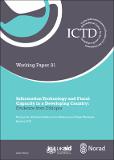| dc.contributor.author | Ali, Merima | |
| dc.contributor.author | Shifa, Abdulaziz | |
| dc.contributor.author | Shimeles, Abebe | |
| dc.contributor.author | Woldeyes, Firew | |
| dc.coverage.spatial | Ethiopia | en |
| dc.date.accessioned | 2016-04-11T13:13:17Z | |
| dc.date.available | 2016-04-11T13:13:17Z | |
| dc.date.issued | 2015-01 | |
| dc.identifier.citation | Ali, M. et al., (2015) Information Technology and Fiscal Capacity in a Developing Country: Evidence from Ethiopia. ICTD Working Paper 31. Brighton: IDS. | en |
| dc.identifier.isbn | 978-1-78118-215-4 | |
| dc.identifier.uri | https://opendocs.ids.ac.uk/opendocs/handle/20.500.12413/11180 | |
| dc.description | taxation; fiscal capacity; information technology; developing economy. | en |
| dc.description.abstract | Governments in developing countries are typically constrained by a limited fiscal capacity to
finance the provision of essential public goods – a constraint that has been cited as one of
the fundamental challenges to economic development. Several developing countries have
recently implemented electronic tax systems (ETS) to improve monitoring tax compliance
using modern information technology (such as electronic sales registry machines (ESRMs)).
Despite the widespread adoption of ETS throughout the developing world, there is a dearth
of systematic evidence on its impact. In this paper, we document the impact of ETS using
quasi-experimental evidence from Ethiopia – a low-income country in Sub-Saharan Africa
which expanded use of ESRMs in recent years. We use administrative data covering the
entire set of those registered for Value Added Tax (VAT) in Ethiopia. We find that ETS
resulted in a large and significant increase in VAT payments (of about 20 log points). We
also find evidence that the effect is driven primarily by firms that are more likely to evade
taxes prior to ETS adoption, suggesting that ETS has minimised tax evasion. | en |
| dc.description.sponsorship | DfID, NORAD. | en |
| dc.language.iso | en | en |
| dc.publisher | Institute of Development Studies | en |
| dc.relation.ispartofseries | ICTD Working Paper;31 | |
| dc.rights | Information Technology and Fiscal Capacity in a Developing Country: Evidence from Ethiopia
Merima Ali, Abdulaziz Shifa, Abebe Shimeles and Firew Woldeyes
ICTD Working Paper 31
First published by the Institute of Development Studies in January 2015
© Institute of Development Studies 2015
ISBN: 978-1-78118-215-4
A catalogue record for this publication is available from the British Library.
All rights reserved. Reproduction, copy, transmission, or translation of any part of this publication may
be made only under the following conditions:
- with the prior permission of the publisher; or
- with a licence from the Copyright Licensing Agency Ltd., 90 Tottenham Court Road, London W1P 9HE, UK,
or from another national licensing agency; or
- under the terms set out below.
This publication is copyright, but may be reproduced by any method without fee for teaching or nonprofit purposes, but not for
resale. Formal permission is required for all such uses, but normally will be granted immediately. For copying in any other
circumstances, or for reuse in other publications, or for translation or adaptation, prior written permission must be obtained from
the publisher and a fee may be payable.
Available from:
International Centre for Tax and Development,
Institute of Development Studies,
Brighton BN1 9RE, UK
Tel: +44 (0) 1273 606261 Fax: +44 (0) 1273 621202
E-mail: info@ictd.ac
Web: www.ictd.ac
IDS is a charitable company limited by guarantee and registered in England (No. 877338) | en |
| dc.rights.uri | http://www.ids.ac.uk/files/dmfile/IDSOpenDocsStandardTermsOfUse.pdf | en |
| dc.subject | Economic Development | en |
| dc.title | Information Technology and Fiscal Capacity in a Developing Country: Evidence from Ethiopia | en |
| dc.type | IDS Working Paper | en |
| dc.rights.holder | © Institute of Development Studies | en |
| dc.identifier.externaluri | http://www.ictd.ac/publication/2-working-papers/24-information-technology-and-fiscal-capacity-in-a-developing-country-evidence-from-ethiopia | en |

